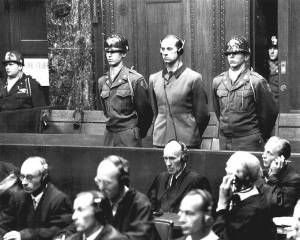纽伦堡法典 Nuremberg Code
纽伦堡法典(Nuremberg Code) ,又叫纽伦堡守则、纽伦堡公约、或纽伦堡宣言,是一套人体试验的伦理准则,为二战后纽伦堡审判的结果。
背景
 1947年8月,判案法官们在对医生的审判(Doctors' trial)中的被告Karl Brandt和其他人等宣布了裁决。法官们也发表了他们对医学实验用于人类的意见。其中几个犯人反驳说他们的实验与战前的实验分别无几,以及法律上也没有对实验合法不合法之说。
1947年8月,判案法官们在对医生的审判(Doctors' trial)中的被告Karl Brandt和其他人等宣布了裁决。法官们也发表了他们对医学实验用于人类的意见。其中几个犯人反驳说他们的实验与战前的实验分别无几,以及法律上也没有对实验合法不合法之说。
同年4月,Dr. Leo Alexander向战争罪行议会(Counsel for War Crimes)呈交了六点方案为合法的医学研究取义。在裁决中这六点被接纳了,另外也加了四点。而这十点方案便成了《纽伦堡守则》的条文。
虽然这些条文的法律效力没被确定下来,它们也没有被直至加进到美国或德国的法律中,但纽伦堡条文和其有关连的赫尔辛基宣言(Declaration of Helsinki)是作为 Code of Federal Regulations Title 45 Volume 46的基本,而其是由美国的卫生及公共服务部(Department of Health and Human Services)颁发的法则,是为管理在美国由联邦政府资助的实验。此外,纽伦堡条文也被加进到个别州份,如加州,和其他国家的法律中。
纽伦堡条文包括某些准则,如知情同意(informed consent)、绝无强迫性的(coercion)、用正确方法来形成的科学实验和对实验参与者的利益。
法典内容
英文网站:www.HHS.gov
中文翻译:何兆雄1)
1. The voluntary consent of the human subject is absolutely essential.
受试者的自愿同意绝对必要。
This means that the person involved should have legal capacity to give consent; should be so situated as to be able to exercise free power of choice, without the intervention of any element of force, fraud, deceit, duress, over-reaching, or other ulterior form of constraint or coercion; and should have sufficient knowledge and comprehension of the elements of the subject matter involved, as to enable him to make an understanding and enlightened decision. This latter element requires that, before the acceptance of an affirmative decision by the experimental subject, there should be made known to him the nature, duration, and purpose of the experiment; the method and means by which it is to be conducted; all inconveniences and hazards reasonably to be expected; and the effects upon his health or person, which may possibly come from his participation in the experiment.
这意味着接受试验的人有同意的合法权力;应处于有选择自由的地位,不受任何势力的干涉、欺瞒、蒙蔽、挟持,哄骗或者其他某种隐蔽形式的压制或强迫;对于实验的项目有充分的知识和理解,足以作出肯定决定之前,必须让他知道实验的性质、期限和目的;实验方法及采取的手段;可以预料得到的不便和危险,对其健康或可能参与实验的人的影响。
The duty and responsibility for ascertaining the quality of the consent rests upon each individual who initiates, directs or engages in the experiment. It is a personal duty and responsibility which may not be delegated to another with impunity.
确保同意的质量的义务和责任,落在每个发起、指导和从事这个实验的个人身上。这只是一种个人的义务和责任,并不是代表别人,自己却可以逍遥法外。
2. The experiment should be such as to yield fruitful results for the good of society, unprocurable by other methods or means of study, and not random and unnecessary in nature.
实验应该收到对社会有利的富有成效的结果,用其他研究方法或手段是无法达到的,在性质上不是轻率和不必要的。
3. The experiment should be so designed and based on the results of animal experimentation and a knowledge of the natural history of the disease or other problem under study, that the anticipated results will justify the performance of the experiment.
实验应该立足于动物实验取得结果,对疾病的自然历史和别的问题有所了解的基础上,经过研究,参加实验的结果将证实原来的实验是正确的。
4. The experiment should be so conducted as to avoid all unnecessary physical and mental suffering and injury.
实验进行必须力求避免在肉体上和精神上的痛苦和创伤。
5. No experiment should be conducted, where there is an a priori reason to believe that death or disabling injury will occur; except, perhaps, in those experiments where the experimental physicians also serve as subjects.
事先就有理由相信会发生死亡或残废的实验一律不得进行,除了实验的医生自己也成为受试者的实验不在此限。
6. The degree of risk to be taken should never exceed that determined by the humanitarian importance of the problem to be solved by the experiment.
实验的危险性,不能超过实验所解决问题的人道主义的重要性。
7. Proper preparations should be made and adequate facilities provided to protect the experimental subject against even remote possibilities of injury, disability, or death.
必须作好充分准备和有足够能力保护受拭者排除那怕是微之又微的创伤、残废和死亡的可能性。
8. The experiment should be conducted only by scientifically qualified persons. The highest degree of skill and care should be required through all stages of the experiment of those who conduct or engage in the experiment.
实验只能由科学上合格的人进行。进行实验的人员,在实验的每一阶段都需要有极高的技术和管理。
9. During the course of the experiment, the human subject should be at liberty to bring the experiment to an end, if he has reached the physical or mental state, where continuation of the experiment seemed to him to be impossible.
当受试者在实验过程中,已经到达这样的肉体与精神状态,即继续进行已经不可能的时候,完全有停止实验的自由。
10. During the course of the experiment, the scientist in charge must be prepared to terminate the experiment at any stage, if he has probable cause to believe, in the exercise of the good faith, superior skill and careful judgement required of him, that a continuation of the experiment is likely to result in injury, disability, or death to the experimental subject.
在实验过程中,主持实验的科学工作者,如果他有充分理由相信即使操作是诚心诚意的,技术也是高超的,判断是审慎的,但是实验继续进行,受试者照样还要出现创伤、残废和死亡的时候,必须随时中断实验。